|
|
|
Sort Order |
|
|
|
Items / Page
|
|
|
|
|
|
|
| Srl | Item |
| 1 |
ID:
136607


|
|
|
|
|
| Summary/Abstract |
Even though democracies by and large share the perception of Iran as a threat to peace and security, they disagree over the appropriate policy response. This paper examines why some democracies prefer accommodation while others plead for confrontation. Using a new data set on democracies' policies toward Iran in the 2000s, we assess the impact of power positions, commercial interests, and domestic political cultures while controlling for government ideology. While we find little support for any impact of power positions, “cultures of dealing with deviance,” that is, the discourses and practices of dealing with violations of norms domestically as institutionalized in a society's criminal law and justice system, have a substantial and statistically significant effect on state policies. Finally, we find qualified support for commercial liberalism: Whereas high levels of total trade do not have the expected effect of making states more accommodationist, high levels of trade in strategic goods such as oil do.
|
|
|
|
|
|
|
|
|
|
|
|
|
|
|
|
| 2 |
ID:
136548


|
|
|
|
|
| Summary/Abstract |
In this paper, I draw on pandemic preparedness and response efforts in Taiwan as a case study to argue that the Li Zhang, a straddler institution at the local level, plays a key role in facilitating state-civil society trust and cooperation in pandemic response.
|
|
|
|
|
|
|
|
|
|
|
|
|
|
|
|
| 3 |
ID:
134560


|
|
|
|
|
| Summary/Abstract |
It is essential that Russia avoid unilateral involvement in Afghan affairs, which otherwise would have adverse consequences for Russia’s national interests both regionally and internationally. And this is the scenario the U.S. is likely to try to push forward given current tense U.S.-Russia relations.
|
|
|
|
|
|
|
|
|
|
|
|
|
|
|
|
| 4 |
ID:
136828
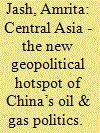

|
|
|
|
|
| Summary/Abstract |
Since the end of the Cold War and the decline of USSR, Central Asia, rich in oil and gas reserves has become the focus of national interest for global powers.The quest for energy has shifted the balance of power to the Central Asian Republics, making it an energy region of global importance. Of which, China’s increasing footprints in Central Asia, particularly in the energy sector, has drawn wide attention. Whereby, the region has risen from being a marginal factor to that of becoming a top priority in China’s foreign policy. It is guided by China’s vital interests to meet its expanding energy needs which face a supply crisis. In this dynamic, Central Asia has become a geopolitical opportunity for China to fulfil its political and economic objectives in the international arena.
|
|
|
|
|
|
|
|
|
|
|
|
|
|
|
|
| 5 |
ID:
134763
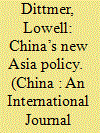

|
|
|
|
|
| Summary/Abstract |
China’s Asian policy has changed significantly since the global financial crisis. Yet the argument here is that in essence, it has not changed. China’s ambition, as first articulated by Mao Zedong, was and has remained to achieve national greatness. Over time, the goal itself has become more focused on China’s own national interests and less on transforming the international order. The means to this end have always been flexible, depending on China’s growth in capabilities and on the opportunities offered by the international environment. In the first decades of the 21st century, China perceived a strategic opportunity to achieve major advances towards achieving this goal, focusing on its immediate regional environment. To do so, it has devised tactics shrewdly designed to do so without precipitating a confrontation with the United States or impinging on its core interests. This “new course” in Chinese foreign policy, addressed primarily to the Asian neighbourhood, was confirmed with mostly cosmetic adjustments in the 2012–13 transition to the fifth generation of the Communist Party of China (CCP) leadership and seems likely to remain in effect for the foreseeable future. The implications of this new Asia policy have already achieved modest success and more importantly no convincing defence has yet been devised.
|
|
|
|
|
|
|
|
|
|
|
|
|
|
|
|
| 6 |
ID:
136702
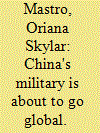

|
|
|
|
|
| Summary/Abstract |
The burgeoning need to protect commercial assets and Chinese nationals abroad will inevitably lead Beijing to develop new military capabilities and take on missions further afield.
|
|
|
|
|
|
|
|
|
|
|
|
|
|
|
|
| 7 |
ID:
136590


|
|
|
|
|
| Summary/Abstract |
Climate change is a serious and inevitable threat for Bangladesh. The country faces significant challenges to its overall development due to frequent flooding, tropical cyclones, droughts and other natural calamities, all of which deplete a significant amount of the annual national budget. Researches show that climate change has increased the frequency of the natural disasters and is likely to intensify further in the future. It is estimated that, climate change combined with the threat of sea level rise, would cause forced-displacement of millions of people from low-lying and coastal areas of densely populated Bangladesh. The paper reveals that climate change has severe impacts on Bangladesh due to its unique geographical location and socio-economic characteristics. This suggests that climate change poses security threats for Bangladesh in terms of weakening the elements of national power and generating violence in the society. The paper also explored that though Bangladesh is making all out efforts to face climate change, but for obvious reason the role of armed forces has not yet been emphasised at the national strategic level. As such, this paper suggests for the incorporation of Bangladesh armed forces in the national response plans on climate change issues.
|
|
|
|
|
|
|
|
|
|
|
|
|
|
|
|
| 8 |
ID:
134524


|
|
|
|
|
| Summary/Abstract |
De facto states, functional on the ground but unrecognized by most states, have long been black boxes for systematic empirical research. This study investigates de facto states’ internal legitimacy—people's confidence in the entity itself, the regime, and institutions. While internal legitimacy is important for any state, it is particularly important for de facto states, whose lack of external legitimacy has made internal legitimacy integral to their quest for recognition. We propose that the internal legitimacy of de facto states depends on how convincing they are to their “citizens” as state-builders. Using original data from a 2010 survey in Abkhazia, we examine this argument based on respondent perceptions of security, welfare, and democracy. Our findings suggest that internal legitimacy is shaped by the key Weberian state-building function of monopoly of the legitimate use of force, as well as these entities’ ability to fulfill other aspects of the social contract.
|
|
|
|
|
|
|
|
|
|
|
|
|
|
|
|
| 9 |
ID:
136605
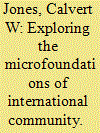

|
|
|
|
|
| Summary/Abstract |
This paper challenges conventional wisdom about the drivers of international community at the individual level. Presenting new data and a novel natural experiment approach to the study of cross-border contact and international community, it tests some of the key microfoundations of international relations theory about how a sense of shared international community may arise and evolve among individuals. The hypotheses are tested using survey data from a large sample (n = 571) of American study abroad students in a range of universities across a treatment and a control group. Surprisingly, findings do not support the main hypothesis that cross-border contact fosters a sense of shared international community. However, the second hypothesis drawn from the liberal paradigm, suggesting that cross-border contact lowers threat perceptions, is strongly supported. The “Huntingtonian” hypothesis that cross-border contact heightens nationalism also garners wide support. The paper concludes with a discussion of the implications for theory and future research, especially the potential of rethinking the drivers of international community at the individual level to rely less on a sense of shared identity and essential sameness, and more on a feeling of “enlightened nationalism” and appreciation for difference
|
|
|
|
|
|
|
|
|
|
|
|
|
|
|
|
| 10 |
ID:
136302


|
|
|
|
|
| Summary/Abstract |
The subject of the resource curse has been studied extensively and the standard conclusion is that countries rich in natural resources are doomed to perform poorly. However the empirical evidence is not so clear cut as to agree with this conclusion. Norway is an oil economy, yet its economy has performed admirably. Other countries such as Netherlands and the United States have done the same
|
|
|
|
|
|
|
|
|
|
|
|
|
|
|
|
| 11 |
ID:
137137


|
|
|
|
|
| Summary/Abstract |
In this study, the motivation behind South Korea's active participation in UN peacekeeping operations is examined. Specifically, whether its participation is driven by economic, political or normative considerations is explored. The argument made here is that a normative consideration is the main factor behind Korea's participation in UN peacekeeping operations. The example of Korea illustrates that not only economic and political considerations but also normative concerns are among the national interests that drive countries to engage in issues of human rights violations in the international community.
|
|
|
|
|
|
|
|
|
|
|
|
|
|
|
|
| 12 |
ID:
136906


|
|
|
|
|
| Summary/Abstract |
The paper disclose the origin and evolution of the national security concept in US political science, analysing the structure of US national security strategy and its relations relation to military policies and military strategy.
|
|
|
|
|
|
|
|
|
|
|
|
|
|
|
|
| 13 |
ID:
135121


|
|
|
|
|
| Summary/Abstract |
Chinese Internet company Baidu recently debuted Busca, a Portuguese version of its search engine localized for Brazilian users. Though, as China’s state news agency Xinhua pointed out, this was not Baidu’s first foray into overseas markets, it was the first time China’s top leader was personally on hand to support the launch. As Chinese President Xi Jinping and Brazilian President Dilma Rousseff jointly pressed a button initiating the service, it appeared China had taken another step in leveraging its fast-growing technology companies to enhance its global soft power—something Xi’s predecessor, Hu Jintao, had declared a key national objective.
|
|
|
|
|
|
|
|
|
|
|
|
|
|
|
|
| 14 |
ID:
135213


|
|
|
|
|
| Summary/Abstract |
WHEREVER ONE looks these days, crises, conflicts and chaos seem to rule. From Tripoli to Tokyo, from Kiev to Caracas, the pace of violence appears to be accelerating. “Looking back over my more than half a century in intelligence,” the director of national intelligence, James Clapper, testified earlier this year, “I have not experienced a time when we’ve been beset by more crises and threats around the globe.
|
|
|
|
|
|
|
|
|
|
|
|
|
|
|
|
| 15 |
ID:
134487


|
|
|
|
|
| Summary/Abstract |
India's nuclear breakout in 1998, foreshadowed as early as 1974, may have been understandable for reasons of global nuclear politics, a triangular regional equation between China, India and Pakistan, and domestic politics. Yet the utility of India's nuclear weapons remains questionable on many grounds. Nuclear deterrence is dubious in general and especially dubious in the subcontinent. Nuclear weapons are not usable as weapons of compellence or defence. They failed to stop the Pakistani incursion in Kargil in 1999 or the terrorist attack on Mumbai in 2008. They will not help India to shape the military calculations of likely enemies. And India's global status and profile will be determined far more crucially by its economic performance than nuclear weapons. Meanwhile, they do impose direct and opportunity costs economically, risk corrosion of democratic accountability, add to global concerns about nuclear terrorism, and have not helped the cause of global nuclear non-proliferation and disarmament. Because the consequences of a limited regional war involving India could be catastrophic for the world, others have both the right and a responsibility to engage with the issue. For all these reasons, a denuclearized world that includes the destruction of India's nuclear stockpile would favourably affect the balance of India's security and other interests, national and international interests, and material interests and value goals.
|
|
|
|
|
|
|
|
|
|
|
|
|
|
|
|
| 16 |
ID:
136669


|
|
|
|
|
| Summary/Abstract |
The Yudhoyono administration appeared to rely on two distinct strategies to preserve national and international security. At one level, it relies on multilateral –oriented diplomacy to institutionalize liberal norms and mechanism including confidence building, cooperative security and peaceful conflict settlement in order to build a cohesive international order. At another level, the Indonesian government sought to modernize to country’s military capabilities and enhance its autonomy for arms.
|
|
|
|
|
|
|
|
|
|
|
|
|
|
|
|
| 17 |
ID:
136403
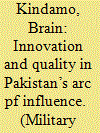

|
|
|
|
|
| Summary/Abstract |
The article discusses the role of Pakistan Armed Forces (PAF) and defence industry to protect the national sovereignty, interests and assets. It mentions the PAF's military relations with countries such as the U.S and China and international organizations such as North Atlantic Treaty Organization (NATO) for the same. It mentions the development and role of defence organizations including Pakistan Ordnance Factories, Pakistan Aeronautical Complex and Heavy Industries Taxila for the same.
|
|
|
|
|
|
|
|
|
|
|
|
|
|
|
|
| 18 |
ID:
134848
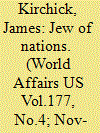

|
|
|
|
|
| Summary/Abstract |
Can there be any doubt that Israel is the most reviled country in the world today? No other nation engenders as much scorn, whether measured in newspaper column inches, street protests, or computer pixels. The only aspect of the hatred more disturbing than its virulent omnipresence is how out of proportion it is to Israel’s real (and alleged) wrongdoing. North Korea functions as a vast gulag, Syrian President Bashar al-Assad deploys chemical weapons on children, and the Castro brothers have ruled despotically over their Cuban island fiefdom for five decades running, but none of these dictatorial regimes invite anywhere near the scrutiny, never mind spittle-flecked loathing, engendered by the Jewish democratic state. A majority of Europeans, according to polls, consider this tiny country of eight million people to be the greatest threat to world peace. An Israeli soldier fires a rubber bullet in the West Bank and it will generate venomous crowds in cities around the globe; Iranian paramilitary basij forces murder peaceful demonstrators in broad daylight and the world emits barely a peep of protest.
|
|
|
|
|
|
|
|
|
|
|
|
|
|
|
|
| 19 |
ID:
134594


|
|
|
|
|
| Summary/Abstract |
The restructuring of the Russian mass media has created a two-tier media system, where some outlets, notably national television, are very tightly controlled, while others, including the internet, are allowed a substantial degree of freedom. The allocation of media outlets to one or other tier is carried out according to procedures that can be compared to the Italian lottizzazione, a method used to allocate political control within the state broadcaster RAI. Recent changes in media usage are now threatening the equilibrium of the system, thus posing a challenge to those responsible for its administration.
|
|
|
|
|
|
|
|
|
|
|
|
|
|
|
|
| 20 |
ID:
136670


|
|
|
|
|
| Summary/Abstract |
In general, the position of Indonesia within the roadmap for peace in the Middle East has not been highly regarded internationally‘. However, as a Muslim—majority nation, Indonesia’s international appeal derives from its success in managing transition to democracy, the friendly and tolerant form of moderate Islam practiced
by the majority of Indonesian Muslims, and the active participation of civil society in the efforts of democratic consolidation. This paper reviews Indonesian foreign policy m the Middle East during the ten years of President Susilo Bambang Yudhoyono’s leadership. This paper addresses the following questions: How does Yudhoyonds “a million friends, zero enemy” policy apply to the Middle East? Is there any domestic factor that shaped Yudhoyono’s policy toward the Middle East? Is there any electoral or national interest objective behind the conception Yudhoyono’s policy? This paper focuses on Yudhoyono’s policy toward l\/[iddle Eastern countries before and after the Arab Spring and it will also include a thorough analysis on Yudhoyono administrations stance in regards to the Israeli—Palestinian conflict.
|
|
|
|
|
|
|
|
|
|
|
|
|
|
|
|
|
|
|
|
|